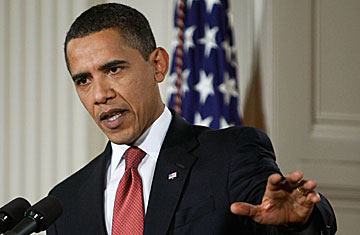
The President meets with the press
In the final years of his second term, it was not unusual to find George W. Bush's motorcade routes lined with protesters chanting their objections or spelling them out on handmade signs. On Monday, President Barack Obama traveled to one of the most economically imperiled parts of the country — Elkhart, Ind. — to find his route bordered by hundreds of waving supporters.
It continues to be this way for Obama, despite a three-week run in the White House that has seen tax scandals, a public admission of presidential missteps and a bitter, sometimes chaotic legislative battle over his $800 billion stimulus plan. The new President remains close to a national golden boy, even as he now oversees a U.S. economy in free fall, the likes of which has not been recorded since before World War II. After Obama was pilloried by pundits for losing control of the stimulus fight inside the Beltway, a Gallup poll conducted late last week found that twice as many Americans approved of Obama's handling of the stimulus package than of his Republican congressional foes' work on the issue. (Read "How to Know When the Economy Is Turning Up.")
Obama proved what a skilled communicator he is on the campaign trail. But with the presidential bully pulpit now at his disposal, his substantial ability to explain himself at a time of widespread disillusionment is the source of tremendous power. Obama chose Monday to come before the American people for his first prime-time address, a dour and downbeat press conference that he used to offer a blunt warning of the perils ahead.
On the economy, he spoke of his concern that the country, burdened by government debt, could descend into a "catastrophe" if no immediate action is taken by Congress. On the war in Afghanistan, he warned of a "big challenge" and an uncertain time line for a withdrawal. He even bemoaned the revelation that slugger Alex Rodriguez had used steroids. "It's depressing news on top of what's been a flurry of depressing items when it comes to Major League Baseball," he said. (See pictures of the world watching Obama's Inauguration.)
In extended answers constructed like well-written essays, Obama spoke of the threat of a downward economic spiral and plummeting growth, and announced that "this year is going to be a difficult year." He used the word crisis 12 times and was careful to qualify his own abilities to solve the country's problems. "I can't tell you for sure that everything in this plan will work exactly as we hoped," he said of the stimulus package. "But I can tell you with complete confidence that a failure to act will only deepen this crisis."
If there was anything uplifting to be found in the address, it was in the contrast. Whereas President Bush steadily eroded his credibility over eight years in office, resorting to rosy statements about the war in Iraq, the response to flooding in New Orleans and the economic boom that proved unfounded, Obama seems determined not to sugarcoat the facts. He spoke of them harshly, without much adornment. With each grim pronouncement, he attempted to claim a level of confidence and competence — even pragmatism — that the nation has not seen for a while.
This is not to say that Obama was always willing to answer reporters' questions. He declined to say whether he supported a "truth commission" to review possible law-breaking by the Bush Administration, saying he needed more time to study the matter. He skirted around questions about his fitful attempts to build true bipartisan support in Congress for his measures, claiming that it will take Washington some time to break its "bad habits." And he issued a series of broadsided attacks on some of his Republican foes, dismissing their critiques of the stimulus plan as pork-barrel spending. "It's a little hard for me to take criticism from folks about this recovery package after they presided over a doubling of the national debt," he said.
By all external measures, the Washington political universe that President Obama now oversees still looks and acts very much like the capital he ran against for two years on the campaign trail. But Obama's performance at the podium is something else entirely, a study in relative candor and nuance. His ability to arouse economically cratering towns to cheer on roadsides remains unmatched. A nervous nation and its new President now pin their hopes for salvation on this ability. The power of the presidential pulpit has rarely been so well used. The only question is how far it can take us.
